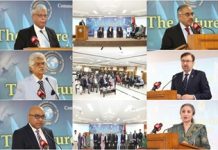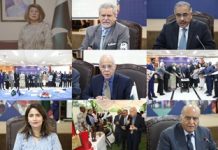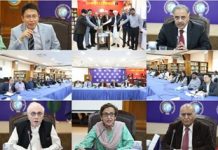State and nation-building are key issues and fundamental challenges in all post-colonial societies. The problem is how to provide a legitimate foundation for rule or what would make rulers lawful. In other words, building a good state is about establishing a relationship of mutual support between the state and society. That is the most difficult task, as those who happen to be in power have little or no regard for the public. They often manipulate it, failing which they suppress it. Once a country settles the state-society relationship, at least in terms of constitutional principles, it may be able to weather political storms and escape from turbulence unhurt. The constitutional principle that has created the best of state-society relationships is democracy. The more a society matures in democratic spirit, the more this principle sinks into the culture and values of a society.
——————————————————————————————————————————————
Surveys suggest that eight in 10 Pakistanis approve of the military’s impact on the country
——————————————————————————————————————————————
Pakistan’s challenges in the area of state-society relations are too many and too complex. The primary reason for this complexity is that democracy was uprooted in the formative years of the state-formation process — rather the murder of democracy. Actually, the undemocratic forces, the military and its social and religious allies made democracy a contested issue by raising questions about its relevance to the social conditions of Pakistan. Anti-democratic elements in other parts of the world have used the same cultural and social arguments against democracy — it is not for us, it is for others. By attacking democracy in a one-sided war waged through a controlled media for decades, military rule and ideas of an Islamic state have been in competition with democratic ideals in Pakistan. Although political parties of all shades and opinions share an interest in democracy, its support at a popular level remains very fragile. Without the shallow roots of democracy, military generals, perhaps, would have found it extremely difficult to establish their rule four times — cumulatively for about three decades.
All states have political systems, a sort of institutional political order. In the modern world, the most popular and widely embraced system is, of course, democracy. In the words of Winston Churchill, “all other alternatives are worse”. A system, like democracy in its true sense, provides the software to the institutional structure of the state. It is this software of democracy or authoritarianism, whatever the case might be, that makes the system work.
While we are in our fourth democratic transition and have celebrated a peaceful transfer of power from one civilian government to another, worries about democracy’s march onwards abound. What is worrisome? There are many reasons but I would like to cite only two. The first is the popularity of the military, if not military rule. All public opinion surveys (PEW, Gallup) suggest that eight in 10 Pakistanis highly approve of the military’s impact on the country. This rating has been consistent for the last half decade or so. The second reason is more worrisome, as it is about the system choice among the Pakistani youth (age 18-29). The British Council Pakistan’s survey this year revealed that only 23 per cent of young men and women think democracy has been good, although 29 per cent of them believe it is the best system.
More alarming is the fact that 38 per cent of youth have preference for military rule, while 32 per cent support Sharia. Democracy, in order of youth preference that may correspond to the general public perceptions trends, has the lowest value as a system.
Apart from consistent campaigns against democracy, it is the poor performance of elected governments that has led to a low social acceptance of democracy. Democracy grows, matures and gets firm roots only and only through showing positive gains for the common man.
Views expressed are of the author and do not necessarily reflect the views of ISS or of the Government of Pakistan.












